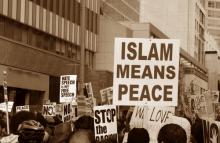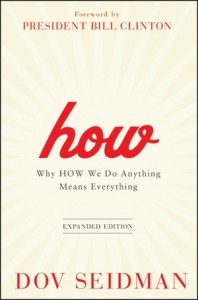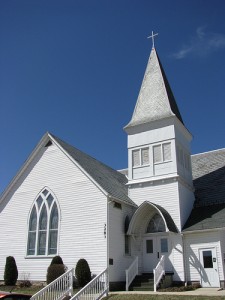Relationships

We have a group at our church that does a weekly sandwich ministry together. Though we already had a group that makes sandwiches each week for a local shelter, another team realized some folks don’t go to shelters, and that they might be missing out on a real opportunity to connect with different folks in our community if they didn’t go out to where the people are.
So now, every week, they walk the streets of downtown Portland and hand out upwards of 100 sandwiches. As they’ve met folks who live outside, they’ve identified other needs some have, such as socks, new underwear, rain gear, flashlights, and batteries. Each week, they come back with a list of needs, and each week our congregation helps fill those needs.
To me, this kind of ministry is exemplary of what missional church is about. We don’t simply wait behind the walls for people to come ask for something; we go out, meet people face-to-face and get to know them. Yes, we offer them a meal, but we also share stories, learn a bit of their history, and they come to know that there actually are flesh-and-blood people behind all those steeples and stone facades.
OUR LIFE TOGETHER can be better. Ours is a shallow and selfish age, and we are in need of conversion—from looking out just for ourselves to also looking out for one another. It's time to hear and heed a call to a different way of life, to reclaim a very old idea called the common good. Jesus issued that call and announced the kingdom of God—a new order of living in sharp contrast to all the political and religious kingdoms of the world. That better way of life was meant to benefit not only his followers but everybody else too. And that is the point of it.
Christianity is not a religion that gives some people a ticket to heaven and makes them judgmental of all others. Rather, it's a call to a relationship that changes all our other relationships. Jesus told us a new relationship with God also brings us into a new relationship with our neighbor, especially with the most vulnerable of this world, and even with our enemies. But we don't always hear that from the churches. This call to love our neighbor is the foundation for reestablishing and reclaiming the common good, which has fallen into cultural and political—and even religious—neglect.
Judaism, of course, agrees that our relationship with God is supposed to change all our other relationships, and Jesus' recitation of the law's great commandments to love God and your neighbor flows right out of the books of Deuteronomy and Leviticus (see Deuteronomy 6:5; Leviticus 19:18). Islam also connects the love of Allah with love and responsibility to our neighbors. In fact, virtually all the world's major religions say that you cannot separate your love for God from your love for your neighbor, your brothers and sisters. Even the nonreligious will affirm the idea of "the Golden Rule": "Do to others as you would have them do to you" (Luke 6:31).
IN A CROWDED auditorium [in Honduras after Hurricane Mitch] that served as a shelter for 900 people, the scarce supply of drinking water was kept in a bucket and labeled with a sign that said "Do not use your own cup." Five bored, mischievous children, however, could think of nothing better than to try to stick their cups in the water. Then one relief worker gave them a special assignment. "This water is very important," she said. "I need you to be the guardians of the water so that no one dips in their own glass." And they, feeling respected and needed, became the fierce, undaunted protectors of the water supply.
Similarly, countless Hondurans are saying, "If not us, then who?"—righting their relationship with themselves, assuming the task of rebuilding their homes and communities, recognizing that progress occurs when they participate. Women, who have never even valued their never-ending activity as work, are speaking up when the pay sheets are evaluated. "I planted a garden. I rebuilt the wall of my house. I earned my corn and beans."
In any genuine community ... self-interest and public interest are not at odds, but are two names for the same thing. —Andrew Delbanco
COMMUNITY ORGANIZING has been around for a long time—certainly long before 2008, when it became a household word during Barack Obama's rise to the presidency. Not that it is understood nowadays any more than before.
I thought I knew what community organizing was when I served as the pastor of First Congregational United Church of Christ and was introduced to a newly formed faith-based organizing project called Inland Congregations United for Change (ICUC) in San Bernardino, California. But I soon learned that community organizing had a different starting point, as well as a different methodology, than I thought.
As a pastor, I had always been concerned about challenging injustice. However, I came to understand that community organizing is less about taking on yet another good cause and more about the important work of building human community.
As such, community organizing is a perfect fit for religious congregations and clergy. It addresses social justice concerns in the larger community, putting democracy to work by giving voice to ordinary families. But more important, community organizing can strengthen the life of the congregation. And it can bring power to the vocation of the religious leader.

THE MASTER, Paul Thomas Anderson’s stomach-punching, fingernails-down-a-chalkboard psychological thriller loosely based on the founding of Scientology, might be more deeply understood as a tale of two egos. We witness a titanic battle for self-control by a man who knows nothing of it (Joaquin Phoenix’s Freddie Quell), while another struggles to distinguish imagination from delusion, his simmering rage emanating perhaps from the terror that the truth he has found may not be enough (Philip Seymour Hoffman’s L. Ron Hubbard surrogate, Lancaster Dodd). Neither of them knows how to love; both are desperate to be loved. They find in each other a conversation partner, a patient, an unrequited lover. They are two of the most human characters the movies have brought us in a long time; their power trips are terrifying, because they may remind us of our own.
There are many key moments: The first meeting between the war veteran and new religious leader, the dictator bonding with his subject over mutual substance abuse; the master holding court in New York society, first offering tender words of potential healing to a grand dame, then exploding at a guest who dares question the source of his “knowledge”; the protégé being experimented with, commanded to walk up and down between a wall and a window until he is both capable of imagining unbridled freedom and driven nearly mad in the process; a science-fictionesque digging for buried treasure on Arizona flatlands that could pass for Mars.
The moment that remains most resonant in my memory after two viewings is still the most ambiguous to me. After Freddie and Dodd first meet, the new father invites the new son (the relationship—and failings of relationship—between fathers and sons is where this film really aches) to attend his daughter’s wedding. The invitation is accompanied by a warning or an invocation: Dodd tells him either “Your memories aren’t welcome” or “Your memories are welcome.” Two viewings leave it unclear—I could check a third time, but it doesn’t really matter, for each is a blessing. You don’t have to carry your trauma always and everywhere. Or you can join this community and still be fully yourself.

AS I WRITE this, the top story on The New York Times website reads “Anti-American Protests Over Film Expand to More than a Dozen Countries.” The slideshow includes images of angry young men with their fists in the air and masks over their faces protesting on dusty streets filled with riot police and open fires. As if Americans’ view of Muslims was not dark enough.
The film in question is the 14-minute YouTube clip called Innocence of Muslims that portrays the Prophet Muhammad as a buffoonish clown and even a child molester. It was created and promoted by individuals with a long history of anti-Muslim activities, who were perfectly aware that it would provoke a small segment of Muslims around the world to violence. And it is now that violent response that is defining the Muslim world to many people—just as in the case of the attacks of 9/11 and the riots provoked by the Danish cartoons in 2005. As @TheBigPharoah said on Twitter: “The sad thing is that those who attack embassies are like hundreds, barely a thousand. Millions are tarnished by what they do though.”
It is impossible to overstate how frustrating it is to be constantly represented by violent thugs and to be asked to explain their actions. Here is the question one African-American seminary student I recently met asked me over email: “Why do so many Muslims ... become so enraged when someone from the West deliberately breaks an Islamic rule they take as offensive?”

This morning, Madu walked the one kilometer path from his village to my house. He is married to Sirima and they have two children: four-year-old Sira, who they call Bonnie, and two-year-old Musa, who they call Papa. He told me that Papa had burned his hand and wrist in the morning cooking fire.
Maybe the path to civility and peace can be found somewhere along the path from my house to Madu’s village.
“Do you have any medicine for a burn?” he asked.
There is a hospital in our small town on the southwestern edge of Mali, but its small staff of doctors serve a large population of people without the use of technology, electricity, or even running water. Many times people come to me for help and healing before they go to the hospital because I have free first aid supplies, a generator, and a deep water well. I consulted my ragged copy of Where There Is No Doctor and turned to the section on the treatment of burns.

A friend of mine — one who’s wiser and kinder and more thoughtful than I — knows the difficult, painful unweaving I’m talking about. She, too, was carroted down the rabbit trail of a hope-filled future shared with someone, only to discover her bed was left just as cold as the promises she’d so earnestly trusted.
“Falling in love is totally magical and beautiful and gives you this insane ability to operate on 4 hours of sleep a night for a long time,” she said. “It chooses you and that gift is one of life’s best ones. You have to choose it back, though.” She paused, her voice cracking, and I knew she meant it. “At some point, you become more real to each other and the hard work sets in. So you try and try, and even then, sometimes it doesn’t work out. And when that happens, you’ll be ok.” I was looking at her across the table.
“Just let it be sad,” she concluded. “Ironically, sadness will be your guide out of sadness.”
What was most telling about the disagreement between the two men was their discussion of Luke 4. Mohler argued the passage should be understood in light of how he interpreted the preaching and teaching of Paul and the other apostles. This means that when Jesus said that he came to bring good news to the poor that good news was personal salvation.
Wallis argued that yes, personal salvation is one part of that good news, but that the other part is the Kingdom of God breaking into the world and transforming societal relationships as well. When the Gospel is proclaimed, it is good news for a poor person's entire being, community and world -- not just his or her soul.
First, it was encouraging to hear Mohler spend a lot of time emphasizing that working for justice is essential to fulfillment of the Great Commission. Throughout the night he repeated his concern that a lot of Churches are REALLY bad at making disciples who actually do the things Jesus told us to do. As the president of one of the largest seminaries in the world, it will be interesting to see if he is able to train a generation of pastors who will do things differently. My concern is that he is missing the connection between his theology and the failure of Christians to actually do justice.
I just returned from a very moving convocation at the Claremont School of Theology where I am on the faculty. We were celebrating the historic founding of a new interreligious theological university that brings together institutions representing the three Abrahamic faiths, along with our newest partner, the Jains. The Jains are an eastern religion founded in India over 2,500 years ago who are perhaps best known for their deep commitment to the concept of no-harm or ahimsa.
While each partner institution will continue to train religious leaders in their own traditions, the Claremont Lincoln University will be a space where future religious leaders and scholars can learn from each other and collaboratively seek solutions to major global issues that no one single religion can solve alone. The CLU's founding vision of desegregating religion was reflected in the extraordinary religious diversity present at the convocation held in a standing room-only auditorium. I sat next to a Jewish cantor and a Muslim woman who had tears flowing down her face as we listened to the prayers offered in all four religions along with a reflection from a Humanist speaker.
As the tenth anniversary of 9/11 approaches, many of us are wondering how best to honor the many victims of that tragedy and its aftermath.
Here in Cincinnati, my wife Marty's answer is inviting some of our friends to join us on a walk with some Muslim and Jewish families she invited by simply calling their congregations. She got the idea from my friends and me at Abraham's Path, who are sponsoring www.911walks.org to help people find or pull together their own 9/11 Walks all over the USA and around the world. The goal of these walks is simple: to help people honor all the victims of 9/11 by walking and talking kindly with neighbors and strangers, in celebration of our common humanity and in defiance of fear, misunderstanding, and hatred.
About two years ago, Minhee and I made one of the hardest decisions we've made thus far in our marriage and in our calling as parents.
In our hope to honor a conviction of the Holy Spirit to give up a year's salary, we had begun the two-year process of saving, selling, and simplifying in 2007. Our goal was to come up with our then year's wages of $68,000 -- in order to launch One Day's Wages. With only a few months left to come up with the total sum, we were a bit short and decided to sublet our home for couple months and asked some friends if we could stay with them on their couches or their guest room.
Needless to say, it was a very humbling time.
Our instruction for ourselves and our children were very simple: Each person gets one carry-on bag for their belongings.


So as I watched the final Hogwarts Express depart from Platform 9¾ in Harry Potter and the Deathly Hallows, Part II this past weekend (slightly teary-eyed, I confess), I started to wonder: What might it sound like to pray in the language of Harry Potter -- language that clearly resonates with folks around the world? Would it be cheesy? Probably. Profane? Perhaps. But I figured the God who relied on earthly parables about wineskins and fig trees to explain the Kingdom would understand.
I was not one of the 1,500 who attended the inaugural Wild Goose Festival in Shakori Hills, North Carolina last month, but I did grow up going to Christian summer camp. What’s the connection, you ask, between a festival and summer camp? Summer camp -- like festivals and extended retreats -- is often deeply formative because it gives kids (and adult counselors, for that matter) a glimpse at a kingdom lifestyle.
As I celebrated my freedom on Independence Day, I found myself considering the promise that my country boasts about: "liberty and justice for all." In particular I was struck by the many freedoms uniquely absent from the lives of so many American workers.

